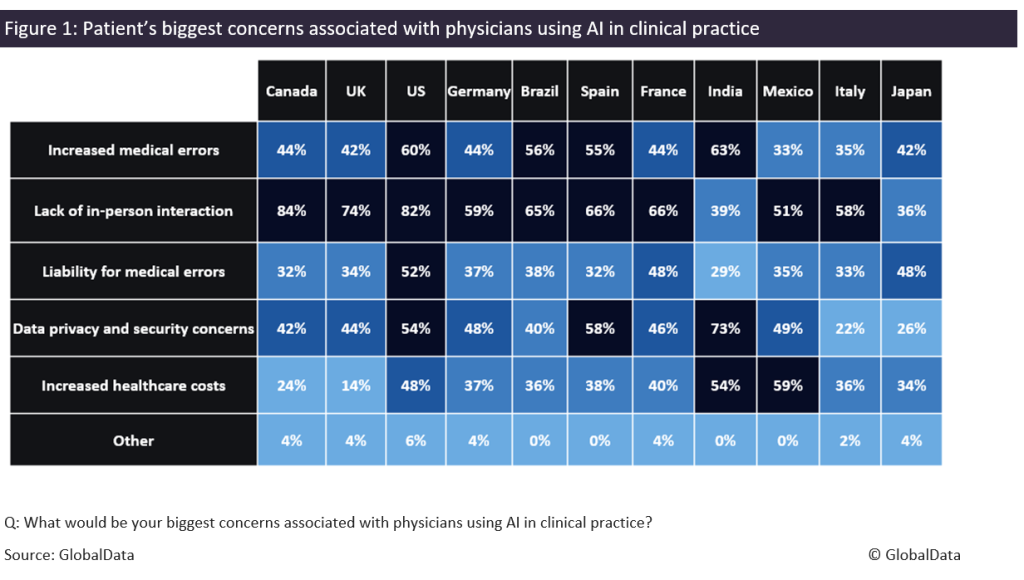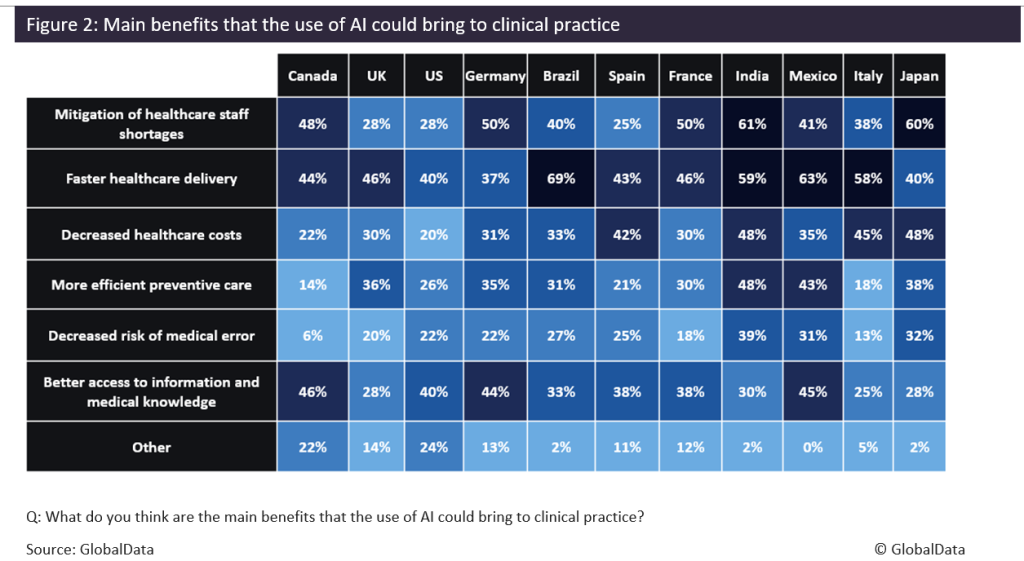Physicians play a crucial role in cultivating doctor-patient relationships by encouraging patients, gaining trust and translating and explaining clinical evidence. Concerns have arisen that the implementation of innovative technologies such as artificial intelligence (AI) could have a damaging effect on this relationship despite the fact that it is touted as a means to ensure faster healthcare delivery and mitigate healthcare staff shortages.
A recent GlobalData survey of 574 patients from the US, France, Germany, Italy, Spain, the UK, Japan, Brazil, Canada, India, and Mexico was conducted from July 2023 to August 2023. It revealed that a lack of in-person interaction, followed by increased medical errors and data privacy and security concerns, was selected as the main concern associated with healthcare professionals (HCPs) using AI in clinical practice (Figure 1).

In the same survey, the patients were also asked about the perceived benefits of the implementation of AI in the healthcare setting. Overall, faster healthcare delivery, followed by the mitigation of healthcare staff shortages, were selected as the main benefits that patients associated with the use of AI in clinical practice (Figure 2).

The healthcare workforce shortage is a major challenge for many healthcare systems worldwide, which are struggling both to find qualified employees to fill open positions and to successfully retain them. For example, a report published by the World Health Organisation in September 2022 indicated that 40% of medical doctors are close to retirement age in one-third of countries in Europe and Central Asia. Given the demographic factors, prevalence of chronic diseases and changes in lifestyles that continue to contribute to an increasing need for healthcare, healthcare systems are facing an ever-shrinking workforce problem. While AI cannot replace in-person relationships, it can help with tasks such as triaging patients, documentation, or the automation of routine tasks, which will give HCPs more time that can be dedicated to direct care.
However, AI does not bring only improvements. Increased medical errors and data privacy concerns are some of the issues that require due consideration. Patients are unsure about what happens to their private and sensitive data when it is used by AI. Concerns have also arisen about how the data used to train AI may be biased. Survey respondents, especially those aged 35 or younger who may be more tech-savvy and more familiar with AI, were concerned about the collection, processing and storage of healthcare data. While patients aged 36 to 75 and older noted the lack of in-person interaction as a top concern, patients aged 18 to 35 were more concerned about the technical side of AI systems.
See Also:
Despite the benefits and drawbacks of AI, the technology is here to stay. Healthcare systems will need to find a way to increase efficiency, specifically to do more with fewer resources available. Technologies like AI can lend a helping hand. However, it is essential to look into building considerate regulations regarding the ethical development and use of the technology, including ensuring a healthy balance between the potential benefits and challenges that AI adoption can present.
How well do you really know your competitors?
Access the most comprehensive Company Profiles on the market, powered by GlobalData. Save hours of research. Gain competitive edge.

Thank you!
Your download email will arrive shortly
Not ready to buy yet? Download a free sample
We are confident about the unique quality of our Company Profiles. However, we want you to make the most beneficial decision for your business, so we offer a free sample that you can download by submitting the below form
By GlobalData






